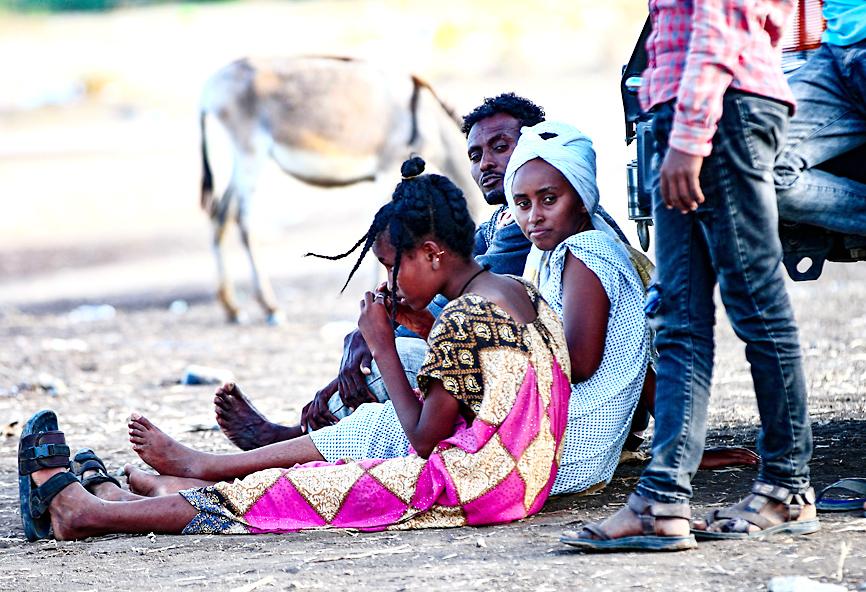The leader of Ethiopia’s Tigray region yesterday confirmed firing missiles at neighboring Eritrea’s capital and is threatening more, marking a huge escalation as the deadly fighting in northern Ethiopia between Tigray forces and the federal government spills across an international border.
Tigray People’s Liberation Front Chairman Debretsion Gebremichael in a telephone interwiew would not say how many missiles were fired at the city of Asmara on Saturday, but said that it was the only city in Eritrea that was targeted.
“As long as troops are here fighting, we will take any legitimate military target and we will fire,” he said, accusing Eritrea of sending troops into the Tigray region and denying reports that Tigray regional forces have entered Eritrea.

Photo: AFP
“We will fight them on all fronts with whatever means we have,” he said.
He asserted that about 16 Eritrean divisions are fighting in what he called a “full-scale war.”
The brewing civil war in Ethiopia between a regional government that once dominated the country’s ruling coalition and a Nobel Peace Prize-winning prime minister whose sweeping reforms marginalized the Tigray region’s power, could fracture a key US security ally and destabilize the strategic Horn of Africa region, with the potential to send scores of thousands of refugees into Sudan.
At least three rockets appeared to be aimed at the airport in Asmara, hours after the Tigray regional government said that it might attack.
It accuses Eritrea of attacking at the invitation of Ethiopia’s government after the conflict in the Tigray region erupted on Nov. 4 with an attack by regional forces on a federal military base there.
In a security alert, the US embassy in Eritrea said “a series of loud noises were heard in Asmara” on Saturday night, and “unconfirmed reports indicate they may have been explosive devices believed to be in the vicinity of the Asmara International Airport. There are no indications the airport was struck.”
Gebremichael would not say how many missiles remain at his forces’ disposal, but said: “We have several. We can use it selectively, anywhere.”
Asked about targeting Ethiopia’s capital, Addis Ababa, he said: “I don’t want to tell you, but the missiles are long-range as well.”
Eritrean officials have not responded to requests for comment.
Ethiopian Prime Minister Abiy Ahmed in a brief statement declared that “Ethiopia is more than capable of attaining the objectives of the operation by itself.”
He did not mention the missiles or Eritrea, but added: “Justice will prevail. Ethiopia will prevail!”
Gebremichael said that he had no communication with Ethiopia’s federal government.
The African Union is pushing for a ceasefire, he said, “but the prime minister is not ready to listen. He believes in the might he has.”
He called it a “really messy situation which requires international intervention.”
Tigray’s regional government broke away from Ethiopia’s ruling coalition last year.

CHAOS: Iranians took to the streets playing celebratory music after reports of Khamenei’s death on Saturday, while mourners also gathered in Tehran yesterday Iranian Supreme Leader Ayatollah Ali Khamenei was killed in a major attack on Iran launched by Israel and the US, throwing the future of the Islamic republic into doubt and raising the risk of regional instability. Iranian state television and the state-run IRNA news agency announced the 86-year-old’s death early yesterday. US President Donald Trump said it gave Iranians their “greatest chance” to “take back” their country. The announcements came after a joint US and Israeli aerial bombardment that targeted Iranian military and governmental sites. Trump said the “heavy and pinpoint bombing” would continue through the week or as long

TRUST: The KMT said it respected the US’ timing and considerations, and hoped it would continue to honor its commitments to helping Taiwan bolster its defenses and deterrence US President Donald Trump is delaying a multibillion-dollar arms sale to Taiwan to ensure his visit to Beijing is successful, a New York Times report said. The weapons sales package has stalled in the US Department of State, the report said, citing US officials it did not identify. The White House has told agencies not to push forward ahead of Trump’s meeting with Chinese President Xi Jinping (習近平), it said. The two last month held a phone call to discuss trade and geopolitical flashpoints ahead of the summit. Xi raised the Taiwan issue and urged the US to handle arms sales to

State-run CPC Corp, Taiwan (CPC, 台灣中油) yesterday said that it had confirmed on Saturday night with its liquefied natural gas (LNG) and crude oil suppliers that shipments are proceeding as scheduled and that domestic supplies remain unaffected. The CPC yesterday announced the gasoline and diesel prices will rise by NT$0.2 and NT$0.4 per liter, respectively, starting Monday, citing Middle East tensions and blizzards in the eastern United States. CPC also iterated it has been reducing the proportion of crude oil imports from the Middle East and diversifying its supply sources in the past few years in response to geopolitical risks, expanding

Pro-democracy media tycoon Jimmy Lai’s (黎智英) fraud conviction and prison sentence were yesterday overturned by a Hong Kong court, in a surprise legal decision that comes soon after Lai was jailed for 20 years on a separate national security charge. Judges Jeremy Poon (潘兆初), Anthea Pang (彭寶琴) and Derek Pang (彭偉昌) said in the judgement that they allowed the appeal from Lai, and another defendant in the case, to proceed, as a lower court judge had “erred.” “The Court of Appeal gave them leave to appeal against their conviction, allowed their appeals, quashed the convictions and set aside the sentences,” the judges